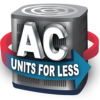1. How They Work and Where They Excel
- Gas Furnaces: Burn fuel (oil or gas) to generate heat, efficient in colder climates (zones 4-8).
- Heat Pumps: Extract heat from the air, even in cold conditions, and transfer it indoors. More efficient in warmer climates (zones 1-3).
Heat pumps offer dual functionality: heating in winter and cooling in summer. Furnaces require a separate air conditioner.
2. Efficiency: More than Just a Number
While high-efficiency gas furnaces can reach 98.5% efficiency, heat pumps can move more heat energy than they consume, making them technically more efficient. However, consider:
- Climate impact: In warmer climates, heat pumps generally use less energy than furnaces.
- Fuel costs: Natural gas is often cheaper than electricity, affecting lifetime operating costs.
3. Safety Considerations: Be Aware and Prepared
- Gas furnaces: Pose risks like leaks and carbon monoxide poisoning (mitigated by safety features).
- Heat pumps: Have risks like refrigerant leaks (also with safety features).
Both require regular maintenance for optimal performance and safety.
4. Cost Comparison: Upfront vs. Long-Term
- Gas furnaces: Lower initial cost, but higher installation and operating costs due to gas lines and maintenance.
- Heat pumps: Higher upfront cost, but lower installation and potentially lower operating costs, especially in moderate climates.
Remember, consider lifetime operating costs, not just initial price.
5. Maintenance Needs: Keeping Your System Healthy
- Heat pumps: Require annual inspections of both indoor and outdoor units.
- Gas furnaces: Often paired with central air units, requiring specific maintenance for both.
- Heat pumps: Typically take up less indoor space than gas furnaces due to outdoor installation.
6. Replacing Your Existing System: Weighing the Options
Replacing your current system depends on several factors:
- Current system's efficiency: Newer, efficient systems might not justify switching.
- Local climate: Consider the suitability of heat pumps in your area.
- Cost implications: Analyze the financial feasibility of the switch.
Similar considerations apply when comparing oil furnaces, electric furnaces, and heat pumps.
7. The Final Decision: It's All About You
Ultimately, the best choice depends on your individual needs, budget, and climate. Carefully evaluate each option's pros and cons to find the heating system that perfectly complements your home and lifestyle.


